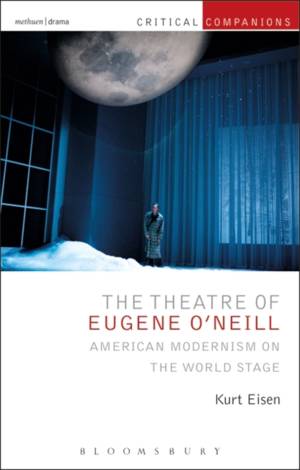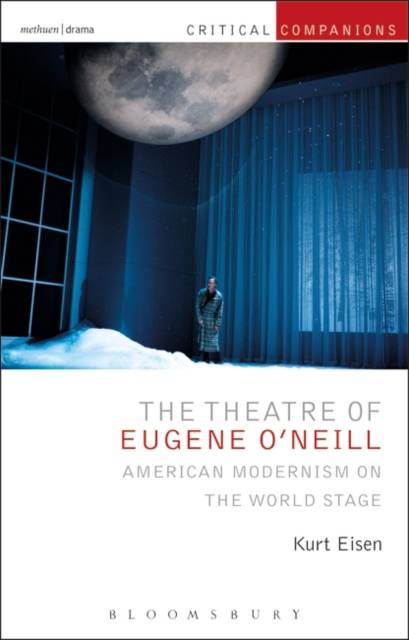
Bedankt voor het vertrouwen het afgelopen jaar! Om jou te bedanken bieden we GRATIS verzending (in België) aan op alles gedurende de hele maand januari.
- Afhalen na 1 uur in een winkel met voorraad
- In januari gratis thuislevering in België
- Ruim aanbod met 7 miljoen producten
Bedankt voor het vertrouwen het afgelopen jaar! Om jou te bedanken bieden we GRATIS verzending (in België) aan op alles gedurende de hele maand januari.
- Afhalen na 1 uur in een winkel met voorraad
- In januari gratis thuislevering in België
- Ruim aanbod met 7 miljoen producten
Zoeken
€ 228,95
+ 457 punten
Uitvoering
Omschrijving
The Theatre of Eugene O'Neill offers a new comprehensive overview of O'Neill's career and plays in the context of the American theatre. Organised thematically, it considers his modernist intervention in the theatre, offers readers detailed analysis of the plays, and assesses the recent resurgence in his reputation and new approaches to staging his work. It includes a study of all his major plays - The Emperor Jones, The Hairy Ape, The Iceman Cometh, Long Day's Journey Into Night, A Moon for the Misbegotten and Desire Under the Elms - besides numerous other full length and one act dramas.
Eugene O'Neill is generally credited with inventing modern American drama, in a time of cultural ferment and lively artistic and intellectual change. Yet O'Neill's theatrical instincts were always shaped by American stage traditions that were inextricable from his sense of himself and his own national culture. This study shows that his theatrical modernism represents not so much a break from these traditions as a reinvention of their scope and significance in the context of international stage modernism, offering an image of national culture and character that opens new possibilities for the stage while remaining rooted in its past.
Kurt Eisen traces O'Neill's modernism throughout the dramatists's work: his attempts to break from the themes, plots, and moral conventions of the traditional melodramatic theatre; his experiments in stagecraft and theme, and their connection to traditional theatre and his European modernist contemporaries; the turn toward direct and indirect self-representation; and his critique of the family and of American 'pipe dreams' and the allure of success.
The volume additionally features four contributed essays providing further critical perspectives on O'Neill's work, alongside a chronology of the writer's life and times.
Eugene O'Neill is generally credited with inventing modern American drama, in a time of cultural ferment and lively artistic and intellectual change. Yet O'Neill's theatrical instincts were always shaped by American stage traditions that were inextricable from his sense of himself and his own national culture. This study shows that his theatrical modernism represents not so much a break from these traditions as a reinvention of their scope and significance in the context of international stage modernism, offering an image of national culture and character that opens new possibilities for the stage while remaining rooted in its past.
Kurt Eisen traces O'Neill's modernism throughout the dramatists's work: his attempts to break from the themes, plots, and moral conventions of the traditional melodramatic theatre; his experiments in stagecraft and theme, and their connection to traditional theatre and his European modernist contemporaries; the turn toward direct and indirect self-representation; and his critique of the family and of American 'pipe dreams' and the allure of success.
The volume additionally features four contributed essays providing further critical perspectives on O'Neill's work, alongside a chronology of the writer's life and times.
Specificaties
Betrokkenen
- Auteur(s):
- Uitgeverij:
Inhoud
- Aantal bladzijden:
- 256
- Taal:
- Engels
- Reeks:
Eigenschappen
- Productcode (EAN):
- 9781474238410
- Verschijningsdatum:
- 16/11/2017
- Uitvoering:
- Hardcover
- Formaat:
- Genaaid
- Afmetingen:
- 145 mm x 218 mm
- Gewicht:
- 439 g

Alleen bij Standaard Boekhandel
+ 457 punten op je klantenkaart van Standaard Boekhandel
Beoordelingen
We publiceren alleen reviews die voldoen aan de voorwaarden voor reviews. Bekijk onze voorwaarden voor reviews.









